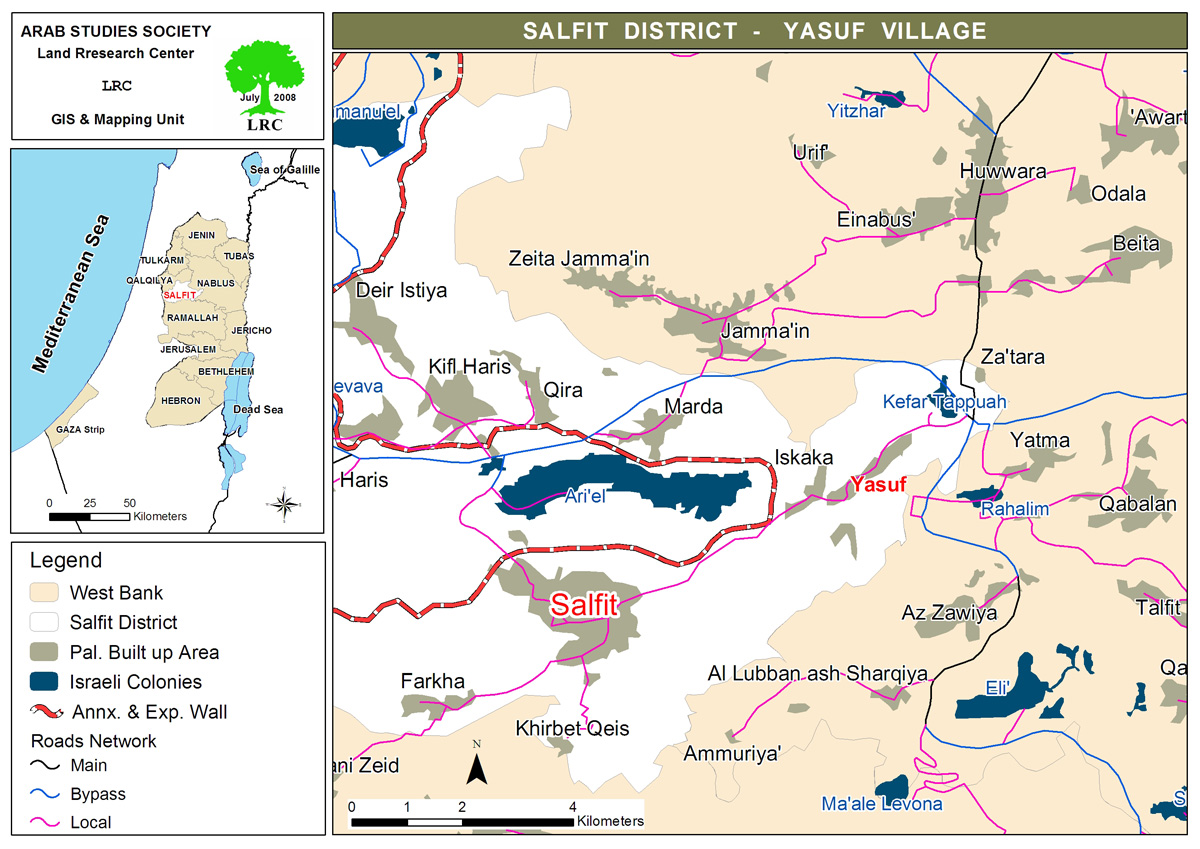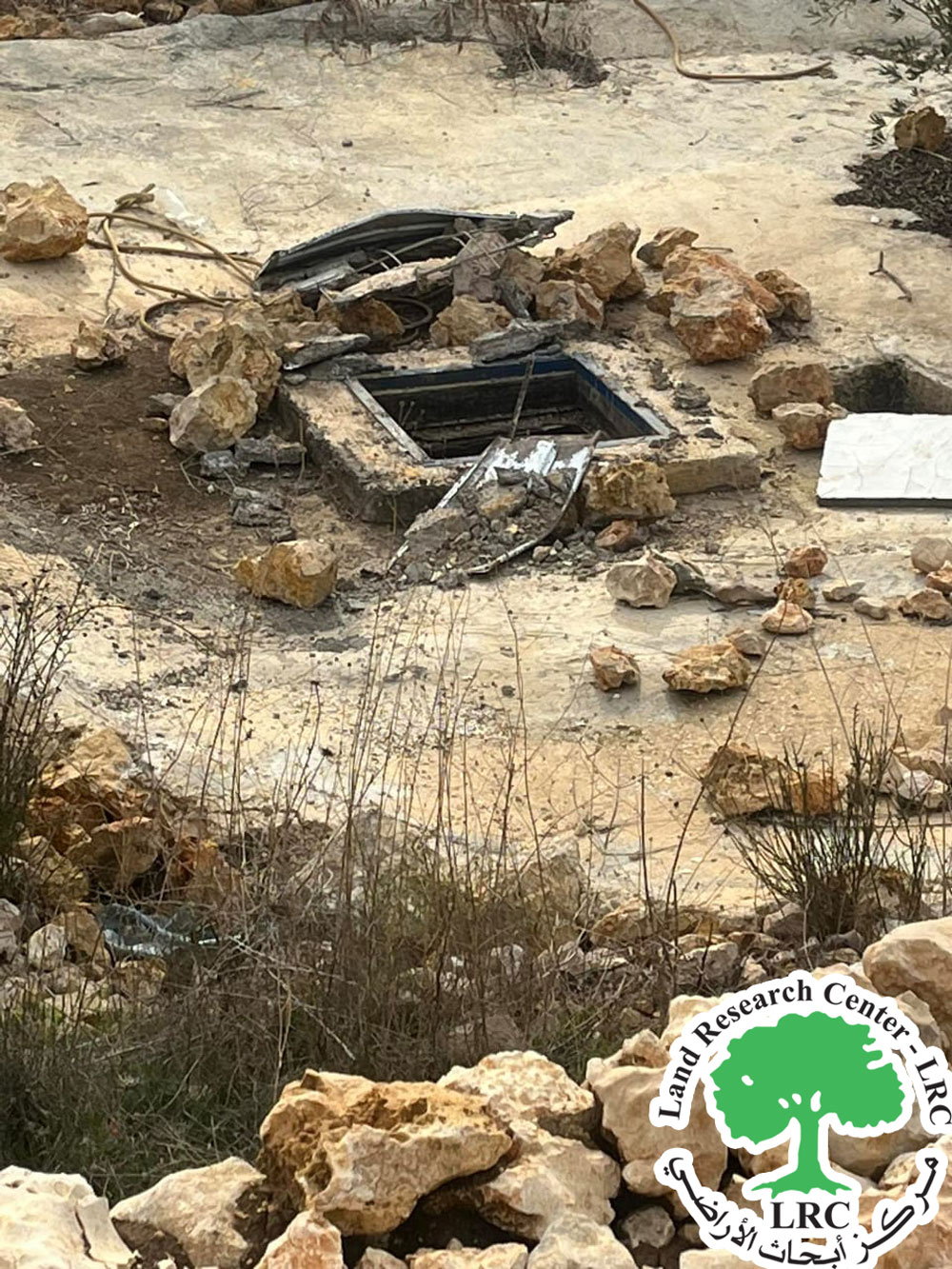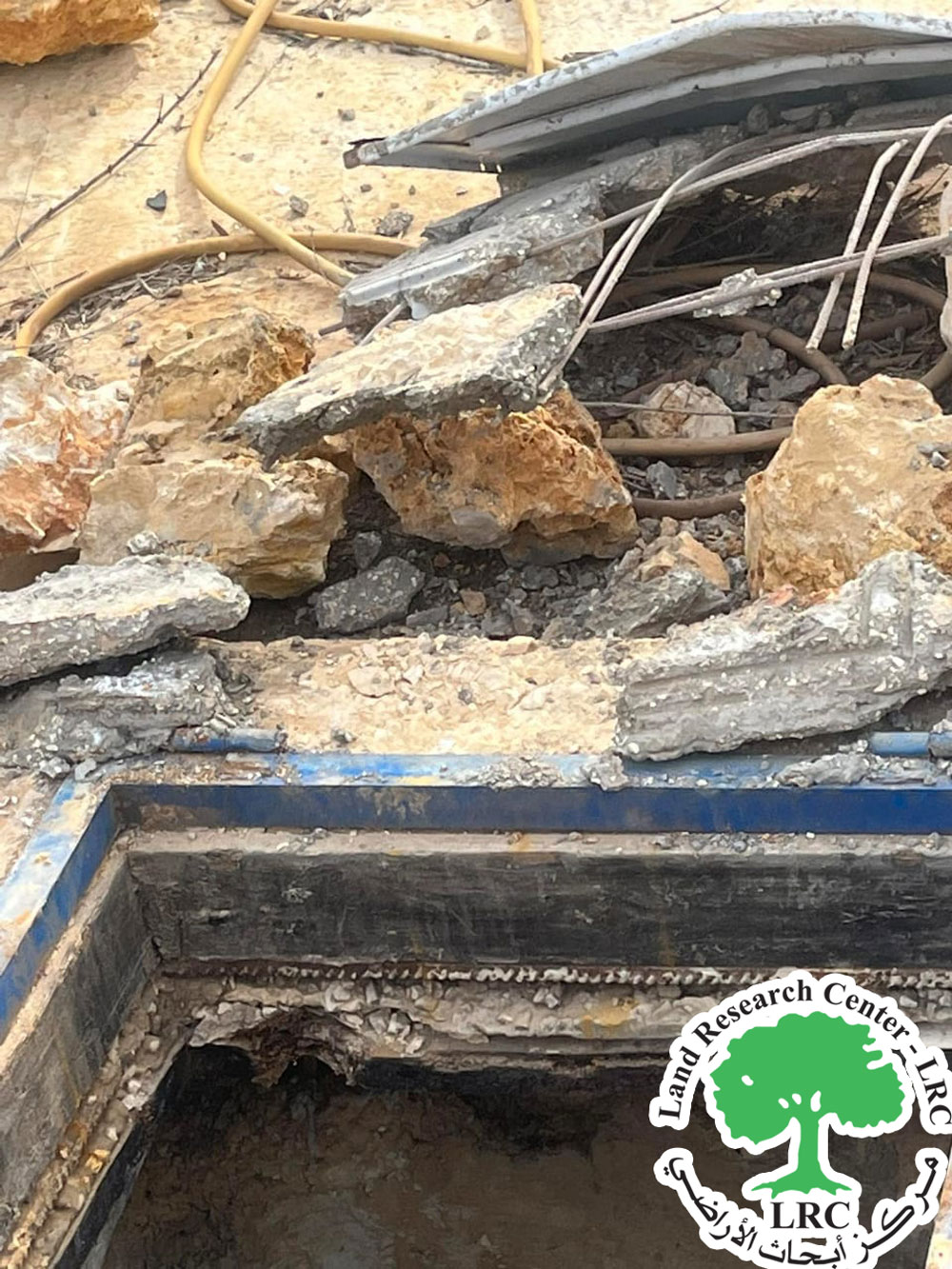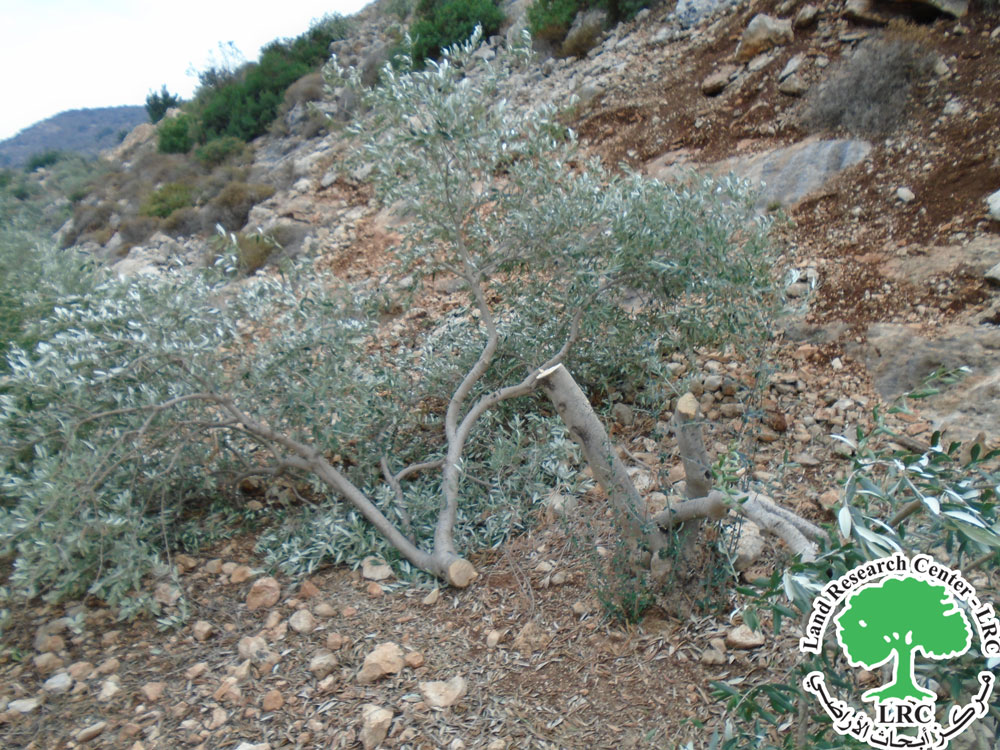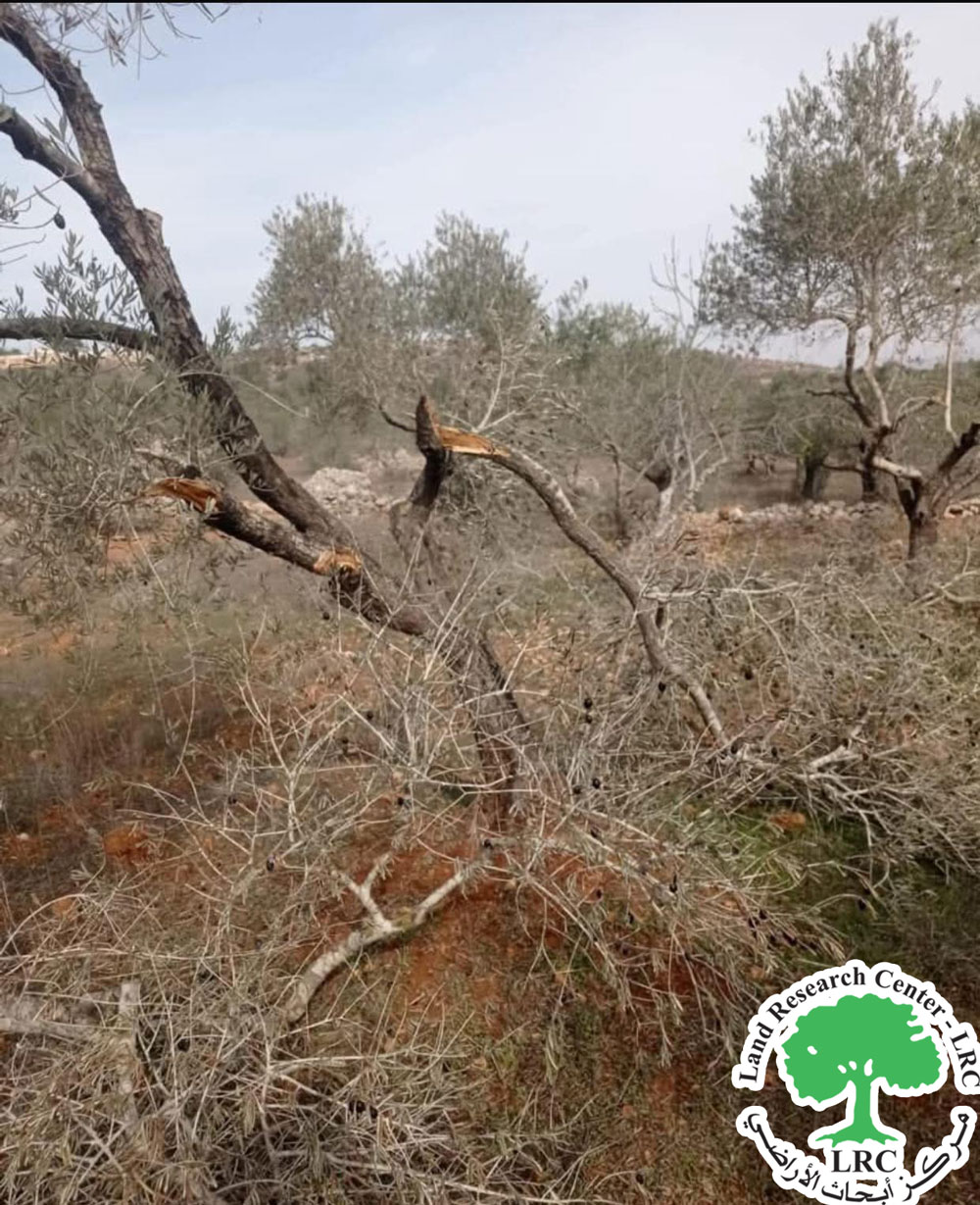مستعمرون يخربون بئر مياه ويقطعون 15 شجرة زيتون في قرية ياسوف جنوب سلفيت
الانتهاك: تخريب بئر و قطع 15 شجرة زيتون.
الموقع: قرية ياسوف الواقعة الى الجنوب من مدينة سلفيت.
تاريخ الانتهاك: 06/12/2024.
الجهة المعتدية: مجموعة من المستعمرين.
الجهة المتضررة: عائلتان من القرية.
تفاصيل الانتهاك:
أقدمت مجموعة من المستعمرين، مع حلول ساعات مساء يوم الجمعة الموافق (6/12/2024)م، على اقتحام منطقة "حريق عبد الرزاق" الواقعة الى الجهة الغربية من قرية ياسوف، ونفذوا اعتداء على بئر لجمع المياه وقاموا بتحطيم بابه وساحته، كما اعتدوا على قطعة أرض مشجرة بالزيتون، حيث قام المستعمرون بقص وتخريب أغصان الأشجار وإلحاق الضرر الجزئي بنحو 15 شجرة زيتون.
الجدول التالي يبين تفاصيل الاضرار بحسب المتابعة الميدانية في موقع الانتهاك:
المزارع المتضرر | عدد أفراد العائلة | عدد الاطفال | عدد الإناث | الاضرار |
زهير جميل عبد الرازق | 6 | 3 | 3 | هدم باب بئر لجمع مياه الامطار سعة 60م3 بالإضافة الى تدمير ساحة البئر وهي باطون بمساحة 9م2 علماً بأن البئر يستخدم لري 9 دونم مزروعة بالزيتون |
جهاد صالح حسين | 4 | 0 | 1 | قطع وتخريب 15 شجرة زيتون بعمر 20 عاماً عبر قص جزئي للأغصان . |
المجموع | 10 | 3 | 4 |
|
من جهته أفاد المزارع زهير جميل عبد الرازق لباحث مركز أبحاث الأراضي بالتالي:
" يقع البئر الذي تم استهدافة في قطعة أرض مشجرة بالزيتون غربي القرية، حيث أن المنطقة تتعرض باستمرار الى اعتداءات المستعمرين الذين يحاولون التعرض للمزارعين و المواطنين على حد سواء، وما جرى من هدم جزئي للبئر كان متوقعاً، حيث يسعى الاحتلال الى التضييق علينا، وقد سبق وأن قام المستعمرون بقص وتخريب أشجار أملكها في نفس الموقع، ورغم ذلك سوف أقوم بترميم البئر مجددا".
وبحسب المتابعات الميدانية لفريق مركز أبحاث الأراضي، فإن كافة الأراضي الواقعة في الجهة الغربية من قرية ياسوف بالاضافة تلك القريبة من مستعمرة "تفوح"، تعرضت الى عدد كبير من الاعتداءات على مدار السنوات الماضية وتركزت طبيعة الاعتداءات في تجريف الأراضي وقطع أشجار الزيتون، هذا بالاضافة الى سرقة ثمار الزيتون و الاعتداء على المزارعين هناك.
تعريف بقرية ياسوف:[1]
تقع قرية ياسوف على بعد 16كم من الجهة الجنوبية من مدينة نابلس ويحدها من الشمال بلدتي حواره وجماعين، ومن الغرب قرية مردا ومن الشرق قرية يتما ومن الجنوب قرية اسكاكا. ويبلغ عدد سكانها 2093 نسمة حتى عام 2017م. وتبلغ مساحتها الإجمالية 6037 دونم، منها 330 دونم عبارة عن مسطح بناء للقرية. هذا وصادر الاحتلال الإسرائيلي من أراضيها ما مساحته 814 دونماً وذلك لصالح:
1- المستعمرات الإسرائيلية: حيث نهبت من أراضي القرية 659 دونماً منها لصالح مستعمرتي، الأولى ” كفار تبواح” والتي تأسست عام 1978م ونهبت 649 دونماً ويقطنها 523 مستعمراً. في حين صادرة المستعمرة الثانية ” ريخاليم – شفوت” 10 دونمات والتي تأسست عام 1991م.
2- الطرق الالتفافية: نهب الطريق رقم 508 الالتفافي ما يزيد عن 155 دونماً.
بالإضافة إلى ذلك فإن قرية ياسوف تقع معظم أراضيها ضمن المناطق المصنفة C أي تحت السيطرة الكاملة للاحتلال لذلك فهي مستهدفة بشكل شبه يومي، وحسب اتفاق أوسلو فان قرية ياسوف مقسّمة إلى مناطق B ( 1427) دونم بينما مناطق C تشكل النسبة الأكبر من مساحة القرية الإجمالية ( 4609) دونم.
التعليق القانوني:
إن البيئة الفلسطينية عامةً تتعرض لانتهاكات بيئية عديدة من قبل الاحتلال الإسرائيلي، ضاربة بعرض الحائط كافة القوانين والأعراف الدولية والوطنية المتعلقة بحماية الحقوق البيئية، وإن الحق بالعيش في بيئة نظيفة وسليمة هو حق لصيق بالإنسان منذ الخليقة. ودائماً ما يحاول الاحتلال الظهور بمظهر الحريص على الشؤون الدولية البيئية على الرغم من توقيعها على اتفاقيات كبرى لحماية البيئة أبرزها اتفاقية بازل عام1989م واتفاقية روتردام عام2008م واتفاقية ستوكهولم2001م واتفاقية رامسار عام 1971م، وكذلك مواثيق جودة الهواء والمناخ ورغم ذلك تقوم بانتهاك جميع هذه المعاهدات دون محاسبة أو مراقبة.
بالإضافة إلى النصوص الخاصة بحق التمتع ببيئة نظيفة وسليمة لكل من يقع تحت الاحتلال العسكري بحسب القوانين والمواثيق والمعاهدات الدولية، كالعهد الدولي الخاص بالحقوق الاقتصادية والاجتماعية والثقافية بموجب قرار الجمعية العامة للأمم المتحدة 2200 ألف (د-21) المؤرخ في 16 كانون الأول / ديسمبر 1966 في المادة (1) البند (2): "...لجميع الشعوب، سعياً وراء أهدافها الخاصة، التصرف الحر بثرواتها ومواردها الطبيعية دونما إخلال بأية التزامات منبثقة عن مقتضيات التعاون الاقتصادي الدولي القائم على مبدأ المنفعة المتبادلة وعن القانون الدولي. ولا يجوز في أية حال حرمان أي شعب من أسباب عيشه الخاصة...".
ومما لا شك فيه أن الاعتداءات التي يقوم بها الجانب الإسرائيلي تخالف قوانين "دولة الاحتلال" قبل غيرها من القوانين، وبالرجوع إلى تفاصيل هذه الحالة نجد أن قانون العقوبات الإسرائيلي لعام 1977م وتعديلاته قد نص على أن التعدي على ممتلكات الغير لارتكاب جريمة فعل معاقب عليه بالقانون، حيث نصت المادة 447 على أنه:" من فعل أي من ذلك بقصد ترهيب مالك عقار أو إهانته أو مضايقته أو ارتكاب جريمة، عقوبته السجن سنتين:
(1) يدخل أو يعبر العقار؛ (2) بعد دخوله العقار بشكل قانوني، بقي هناك بشكل غير قانوني.
(ب) تُرتكب جريمة بموجب هذا القسم عندما يحمل الجاني سلاحًا ناريًا أو سلاحًا باردًا، عقوبته هي السجن أربع سنوات".
وبقراءة نص هذه المادة نجد بأن قانون العقوبات الإسرائيلي جرم مجرد دخول أي شخص بدون وجه حق إلى عقار ليس بعقاره بهدف الإهانة أو المضايقة أو الترهيب ويعاقب على ذلك الفعل سنتين، وتتضاعف العقوبة عندما يرتكب الشخص المعتدي أي فعل في عقار غيره باستخدام سلاح أو أداة حادة أو ما يسمى بالسلاح البارد فتصبح أربع سنوات، وبطبيعة الحال عندما يدخل المستعمر إلى أرض فلسطيني في منطقة "ج" ، ويقوم باقتلاع و/أو تدمير المحاصيل الزراعية والأشجار، ويدمر المنشآت الزراعية ويكون حاملاً سلاح ومحمياً بمجموعات من المستعمرين المسلحين أو الجيش الإسرائيلي وهذا ما تم تجريمه صراحةً في نص المادة المذكورة من قانون العقوبات الإسرائيلي آنف الذكر.
وبعد إعادة النظر إلى حالة الاعتداء المذكورة نجد بأن المستعمرين قاموا بأنشطة وأفعال استفزازية، بحق الأراضي الزراعية من قلع للأشجار وتدمير وتخريب لبئر المياه ، وهذا ما نُصَ عليه صراحةً في المادة 192 من قانون العقوبات المذكور أعلاه:" يعاقب بالحبس كل من هدد شخصًا بأية طريقة بإيذاء غير مشروع بجسده أو حريته أو ماله أو سمعته أو مصدر رزقه أو حياة شخص آخر بقصد تخويفه أو مضايقته. لثلاثة أعوام".
وعليه فإن المعتدي الإسرائيلي يخالف دون أي وجه حق ما جاء في القوانين والمعاهدات الدولية، وما جاء أيضاً في قوانين "دولته" الداخلية مخالفةً صريحة، وعليه لا بد على "القضاء الإسرائيلي" محاسبة ومعاقبة المستعمرين على هذه الأفعال بموجب نصوص قوانينهم وما جاء فيها. إلا أنه لا يوجد أي مسائلة قانونية للمعتدي من قبل القضاء الإسرائيلي. رغم أنه من حق أي إنسان على هذه الأرض أن يعيش في بيئة نظيفة وسليمة وآمنة من أي انتهاك واعتداء ضدها.
[1] مركز ابحاث الاراضي
مشروع: حماية الحقوق البيئية الفلسطينية في مناطق "ج" SPERAC IV - FCDO
Disclaimer: The views and opinions expressed in this report are those of Land Research Center and do not necessarily reflect the views or positions of the project donor; the Norwegian Refugee Council.
إخلاء المسؤولية: الآراء ووجهات النظر الواردة في هذا التقرير هي آراء ووجهات نظر مركز أبحاث الأراضي ولا تعكس بالضرورة وجهات نظر أو مواقف الجهة المانحة للمشروع؛ المجلس النرويجي. للاجئين
الصور توضح آثار تخريب البئر وأشجار الزيتون في قرية ياسوف - محافظة سلفيت
